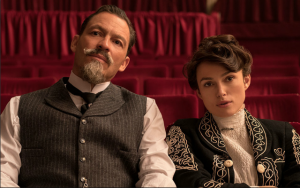COLETTE: 4 STARS. “fascinating story of a pioneering woman.”
 Bad theatre is like dentistry,” declares critic and author Henry Gauthier-Villars (Dominic West). “You’re compelled to sit in your chair, as they drill into your head, until the procedure is over.” Luckily there is no such endurance test in “Colette,” a sparkling biopic that shows star Keira Knightley in top form.
Bad theatre is like dentistry,” declares critic and author Henry Gauthier-Villars (Dominic West). “You’re compelled to sit in your chair, as they drill into your head, until the procedure is over.” Luckily there is no such endurance test in “Colette,” a sparkling biopic that shows star Keira Knightley in top form.
“Colette” begins traditionally enough, with “Masterpiece Theatre” style attention to detail as the love affair between Parisian “literary entrepreneur” Gauthier-Villars, who goes by the nom-de-plume Willy, woos country girl Sidonie-Gabrielle Colette (Knightley). They soon marry, and after slowly adapting to life in the salons of the big city—“You must present your personality with a capital P,” he says.—she is drawn into the family business ghost writing a novel loosely based on her life. The resulting book, “Claudine à l’école,” released under the Willy name, becomes a sensation, bringing in some much needed money.
As Willy hogs the spotlight she continues to write the increasingly popular books. Soon her character, Claudine, is the fictional exemplar of the Belle Époque, influencing fashion, literature and dominating the trendy magazines of the day. Denied the recognition that should accompany their success Colette asserts her independence, beginning an affair with “wayward American debutante” Georgie Raoul-Duval (Eleanor Tomlinson). That relationship blows up when it’s revealed that Willy is also trysting with the same woman.
Professional and personal twists and turns lead the increasingly distant couple into bankruptcy and into a dodgy business deal that sees Colette financially cut out of her most popular character’s future earnings. On a happier note she begins a relationship with “Missy” (Denise Gough), the highborn transgender pioneer Marquise de Belbeuf.
“Colette” is a period piece, all corsets and dinner jackets, but one with a very modern approach. Before her awakening Colette finds herself under the thumb of a domineering husband but afterward she forges a life that broke rules and paved the way for modern feminism and LGBTQ acceptance. It is a well-told story of empowerment that blends creative process, sexual politics and Colette’s progressive spirit.
“Colette’s” set decoration and Wash Westmoreland’s direction are top notch but it is Knightley that breathes life into the frothy but fascinating story of a pioneering woman. She provides both the heart and furious intellectualism necessary to present a fully rounded portrait of a person who waged a battle against societal norms and a life lived in the shadows.
